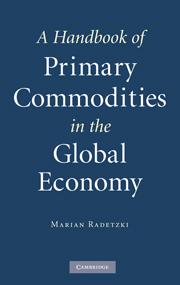Book contents
- Frontmatter
- Contents
- List of figures
- List of tables
- Acknowledgments
- Introduction
- 1 The historical framework
- 2 The geography of commodity production and trade
- 3 Comparative advantage and the trade policy distortions
- 4 Price formation and price trends in commodities
- 5 The commodity exchanges, commodity investments, and speculation
- 6 The economics of exhaustible resource depletion
- 7 Fears of, and measures to assure, supply security
- 8 Producer cartels in international commodity markets
- 9 Public ownership in primary commodity production
- 10 The monoeconomies: issues raised by heavy dependence on commodity production and exports
- References
- Index
9 - Public ownership in primary commodity production
Published online by Cambridge University Press: 23 June 2009
- Frontmatter
- Contents
- List of figures
- List of tables
- Acknowledgments
- Introduction
- 1 The historical framework
- 2 The geography of commodity production and trade
- 3 Comparative advantage and the trade policy distortions
- 4 Price formation and price trends in commodities
- 5 The commodity exchanges, commodity investments, and speculation
- 6 The economics of exhaustible resource depletion
- 7 Fears of, and measures to assure, supply security
- 8 Producer cartels in international commodity markets
- 9 Public ownership in primary commodity production
- 10 The monoeconomies: issues raised by heavy dependence on commodity production and exports
- References
- Index
Summary
Introduction
Why is it important to devote special attention to the issue of public ownership in a book that deals with international commodity markets? The answer is straightforward. As will be shown, state-owned enterprises have for several decades accounted for sizable shares of global supply in many commodities. There is a common belief that these enterprises behave differently from privately owned supply agents. This claim must be investigated, for, if it is true, then the analyses of how international commodity markets function, based solely on the private enterprise paradigm, could plausibly go seriously astray.
There is another reason, very important, though not equally central to the themes of the present book, for studying state enterprises in commodity production and trade. Such enterprises are particularly dominant in the developing world. A majority of them were established through nationalizations in the 1960s and 1970s, because it was believed that public ownership would speed up the economic development process. It is essential to verify whether the purported benign effects of nationalization have in fact occurred, especially since the belief has recently gained renewed popularity.
There are two important limitations to the treatment of this subject in the present chapter. First, it deals only marginally with the former socialist countries, where prior to 1990 virtually all production was in public hands as a matter of course. Until that time, therefore, there was hardly any private entrepreneurship to provide a scale of comparison with state-owned enterprise.
- Type
- Chapter
- Information
- A Handbook of Primary Commodities in the Global Economy , pp. 166 - 187Publisher: Cambridge University PressPrint publication year: 2008



